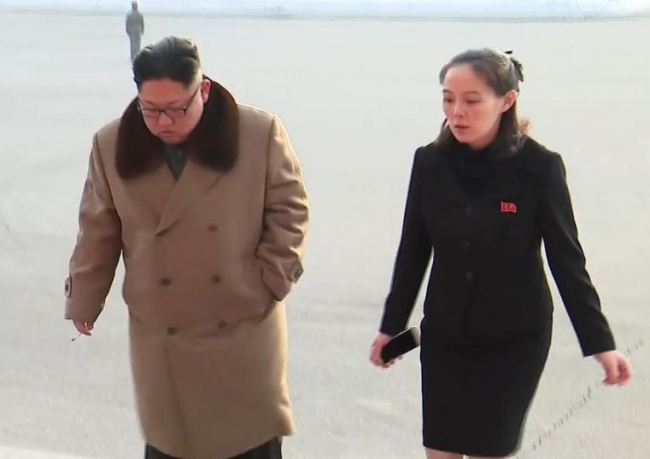Will visit by NK leader’s sister pave way for inter-Korean summit?
By Jung Min-kyungPublished : Feb. 8, 2018 - 17:24
With North Korea’s decision to dispatch Kim Jong-un’s sister to an international event hosted in South Korea, experts here are interpreting her visit as a diplomatic breakthrough that could lay the foundations for a possible inter-Korean summit.

North Korea informed the South on Wednesday that its leader Kim Jong-un’s younger sister Kim Yo-jong, first vice director of the Central Committee of North Korea’s ruling Workers’ Party, would be part of the high-level delegation for the Feb. 9-25 PyeongChang Winter Olympics.
Given her ties to the young dictator, several experts believe Kim Yo-jong’s remarks could be taken to directly represent Kim Jong-un’s current position on inter-Korean relations. Her visit alone could be a message from the North of its desire to mend ties with South Korea, they say.
“There is a possibility that Kim Yo-jong’s visit could lead to an inter-Korean summit after the PyeongChang Olympics,” Koh Yu-hwan, a professor of North Korean studies at Dongguk University in Seoul, told The Korea Herald.
“The bilateral meeting would symbolize a recovery of inter-Korean ties, and Kim Jong-un said in his New Year’s address that he is strongly willing to patch up ties with South Korea,” he added.
If the two Koreas decide to hold a bilateral summit after the Winter Olympics, it would mark the third of its kind and first under the Kim Jong-un regime. The first was held between President Kim Dae-jung and North Korean leader Kim Jong-il on June 15, 2000 and the second summit was held between President Roh Moo-hyun and Kim Jong-il on Oct. 4, 2007.
The summits are viewed as symbols of peace on the Korean Peninsula, as statements issued following the meetings were aimed at building cooperation between the two Koreas.
But Koh underlined that both Koreas would have to reach some sort of consensus on the North Korean nuclear issue, citing previous bilateral summits that were held after moderating frameworks were drawn. The process will be difficult, Koh said, as the US and other nations would become largely involved as well.
“The 2000 summit was held after the so-called ‘Perry Process,’ a 1999 proposal for a three-stage resolution to North Korea’s nuclear weapons program. In 2007, the Feb. 13 agreement which came as a result of the six-party talks is believed to have triggered the second summit” added Koh.
“The Perry Process,” named after former US Defense Secretary William Perry who worked for the Bill Clinton administration in the US, included freezing North Korea’s nuclear and missile programs and normalizing relations between Pyongyang and Washington. But the vision fizzled out with the arrival of the George W. Bush administration in 2001.
The Feb. 13, 2007 accord was the first follow-up to the Sept. 19 Joint Statement of 2005, which required North Korea to shut down its main nuclear facilities in exchange for a phased delivery of 1 million tons of heavy fuel oil. The six-party talks in 2007 involved both Koreas, the US, China, Japan and Russia.
Cheong Wa Dae has expressed willingness to start a more solid dialogue with Pyongyang, using the Winter Olympics as a stepping stone. The liberal Moon Jae-in administration believes North Korea’s participation in the games may open opportunities for peaceful denuclearization.
President Moon Jae-in is scheduled to host a luncheon for North Korea’s high-level delegation to the Olympics on Saturday, around noon, and Kim Jong-un’s sister is to attend the event.
South Korean daily the Joongang Ilbo reported Thursday, citing a source close to Cheong Wa Dae, that the presidential office was considering sending a special envoy to the North if the high-level North Korean delegation delivers a personal message from Kim Jong-un.
However, some experts caution that while Kim Yo-jong’s visit may lay the foundations for smoother inter-Korean ties after the PyeongChang Olympics, it may be too early to link it to a summit.
“Kim Yo-jong’s visit can be seen as a sign of willingness from Kim Jong-un to mend broken inter-Korean ties, but a bilateral summit is something that involves a bigger picture, especially under the current situation surrounding North Korea’s nuclear weapons program,” said Lee Woo-young, a professor at the University of North Korean Studies in Seoul.
By Jung Min-kyung (mkjung@heraldcorp.com)










![[Hello India] Hyundai Motor vows to boost 'clean mobility' in India](http://res.heraldm.com/phpwas/restmb_idxmake.php?idx=644&simg=/content/image/2024/04/25/20240425050672_0.jpg&u=)









